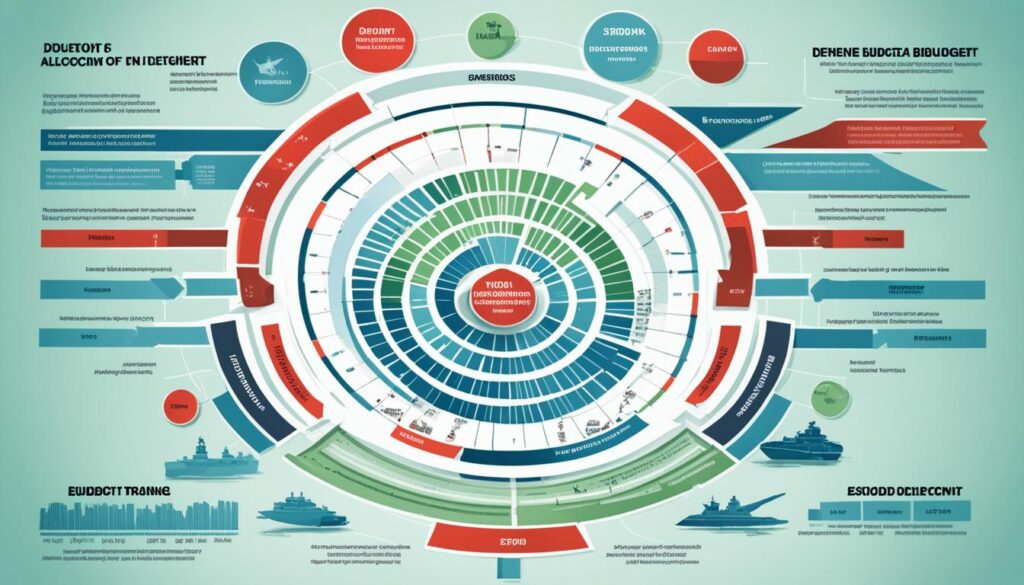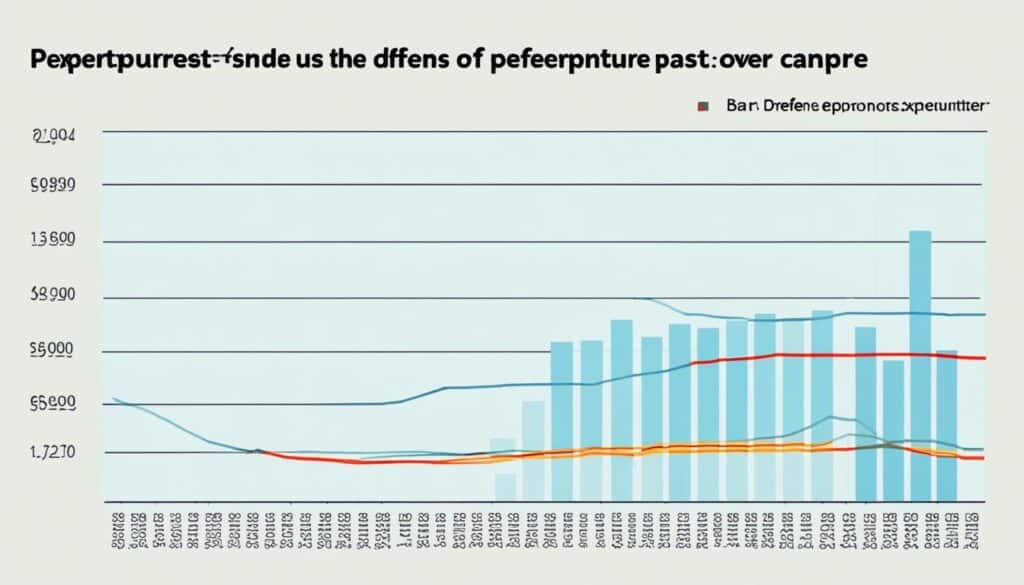Safeguarding our nation and boosting the economy are top goals for the U.S. government. So, it invests heavily in defense. In the fiscal year 2023, the U.S. spent a massive $820 billion on defense, which was 13% of the total budget. This shows how much the nation values protecting its people and interests, both at home and abroad.
The Department of Defense (DoD) got the biggest share, $776 billion, for its military work. Other agencies used $43 billion for activities related to defense. This detailed approach ensures national security is strong. The DoD’s spending covers many important areas, such as operation and maintenance, personnel, weapon procurement, research, and building military facilities.
Defense spending’s makeup has changed over the years. Now, more is spent on day-to-day military tasks. This includes keeping equipment running, training, and taking care of health. The budget also covers veterans’ benefits, services, and international relationships. These show how tightly connected they are to keeping our nation safe.
Globally, the U.S. is a leader in defense spending. It spends more than other advanced nations, in dollars and as a part of the economy. This high spending shows the U.S.’s serious commitment to staying strong and ready against new threats.
Key Takeaways:
- Defense expenditure is a top priority for the United States federal government, accounting for a significant portion of federal spending.
- The Department of Defense (DoD) receives the majority of the defense budget, allocating funds towards various military activities.
- Categories within defense spending include operation and maintenance, military personnel, procurement of weapons and systems, research and development, as well as construction of military facilities and family housing.
- The composition of defense spending has evolved over time, with operation and maintenance becoming a larger percentage of the budget.
- The United States outpaces other advanced economies in defense expenditure, both in terms of raw dollars and as a share of the economy.
How Defense Budget Allocations Impact National Security
Defense budget allocations are key for national security. The bulk goes to the Department of Defense. This money keeps the country safe and protects its interests.
Operation and Maintenance:
Operation and maintenance get a big piece of the budget. This covers running military operations, training, and fixing equipment. It also pays for military healthcare. Money in this area is crucial. It makes sure our armed forces are ready and effective.
Military Personnel:
The budget takes care of military members too. It pays for their salaries and retirement. Giving good pay and benefits draws in and keeps skilled people. They help make the country’s defense strong.
Procurement of Weapons and Systems:
Buying new weapons and systems is another part of the budget. This area supports getting up-to-date technologies, upgrading equipment, and buying new weapons. Updating our arsenal is key. It helps us face new threats and stay ahead of enemies.
Research and Development:
There’s also a focus on research and development. This part works on making new weapons and equipment. Investing in R&D lets us bring new technologies to our military. These can give our troops an edge in battle.
Construction and Management of Military Facilities:
The budget helps build and run military facilities too. These include bases and training sites. Having well-kept and well-placed places helps the military work better.
Spending in these areas keeps us ready and able to meet new threats. It focuses on making the military strong through activities, updates, and technology. These investments keep the USA leading in defense and protect our people and friends around the world.
Trends in Defense Expenditure and Comparison to Other Countries
In the United States, we see changes in defense spending over time. Since 1980, after adjusting for inflation, spending grew by 62%. This growth, however, is slower than other federal expenses, which increased by 175%.
Many things affect how much a country spends on defense, like wars and cuts in spending. These events change how much money goes to the military.
The U.S. leads the world in defense spending, beating countries like China and Russia. This shows America’s strong commitment to its defense.
But, looking at just the numbers doesn’t tell the whole story. Smaller countries can spend more per person on defense, showing their dedication to staying safe. This means there are many ways to show how much a nation cares about its defense.
Another key point is how spending on defense compares to a country’s economy. This ratio tells us how big a role a nation sees defense in its overall plans. It shows how much they value security and their interests.
Comparison of Defense Expenditure as a Percentage of GDP
| Country | Defense Expenditure as a Percentage of GDP |
|---|---|
| United States | 3.4% |
| China | 1.9% |
| Russia | 3.9% |
| NATO Average | 1.6% |
The table compares how much countries spend on defense compared to their GDP. It shows the U.S. devotes more of its economy to defense than China and NATO’s average. Russia, however, spends a larger part of its GDP on defense.
Looking at defense spending trends and comparisons helps us understand a nation’s security commitment. For the U.S., it shows that defense is a major national priority, both in money and in GDP share.
Conclusion
After looking closely at defense spending, it’s clear how much the U.S. values its safety. Money goes into military actions, getting new gear, and making new stuff. We do this to stay ahead of changing risks and problems, keeping our country and friends safe.
The U.S. spends more on defense than any other place. Even though smaller countries might invest more of their money in defense, looking at spending based on how big a country’s economy is shows how much we all care about staying safe.
In a changing world, our defense budget stays crucial for keeping us and the whole world safe. Spending on defense helps not just the U.S. but also supports world peace and helps the economy. By spending wisely on defense and being ready for new challenges, we keep our place as a top protector of national security.
FAQ
What is defense expenditure?
Why is national security important?
How does the defense budget impact national security?
How has defense expenditure changed over time?
How does defense spending in the United States compare to other countries?
What does defense spending as a proportion of GDP indicate?
What does analyzing defense expenditure reveal?
What is the role of the defense budget in protecting the United States?
Source Links
- https://www.pgpf.org/budget-basics/budget-explainer-national-defense
- https://usafacts.org/articles/how-much-does-the-us-spend-on-the-military/
- https://www.rand.org/topics/military-budgets-and-defense-spending.html
Disclaimer
All information on this website is of a general nature. The information is not adapted to conditions that are specific to your person or entity. The information provided can not be considered as personal, professional or legal advice or investment advice to the user.
This website and all information is intended for educational purposes only and does not give financial advice. Signal Mastermind Signals is not a service to provide legal and financial advice; any information provided here is only the personal opinion of the author (not advice or financial advice in any sense, and in the sense of any act, ordinance or law of any country) and must not be used for financial activities. Signal Mastermind Signals does not offer, operate or provide financial, brokerage, commercial or investment services and is not a financial advisor. Rather, Signal Mastermind Signals is an educational site and a platform for exchanging Forex information. Whenever information is disclosed, whether express or implied, about profit or revenue, it is not a guarantee. No method or trading system ensures that it will generate a profit, so always remember that trade can lead to a loss. Trading responsibility, whether resulting in profits or losses, is yours and you must agree not to hold Signal Mastermind Signals or other information providers that are responsible in any way whatsoever. The use of the system means that the user accepts Disclaimer and Terms of Use.
Signal Mastermind Signals is not represented as a registered investment consultant or brokerage dealer nor offers to buy or sell any of the financial instruments mentioned in the service offered.
While Signal Mastermind Signals believes that the content provided is accurate, there are no explicit or implied warranties of accuracy. The information provided is believed to be reliable; Signal Mastermind Signals does not guarantee the accuracy or completeness of the information provided. Third parties refer to Signal Mastermind Signals to provide technology and information if a third party fails, and then there is a risk that the information may be delayed or not delivered at all.
All information and comments contained on this website, including but not limited to, opinions, analyzes, news, prices, research, and general, do not constitute investment advice or an invitation to buy or sell any type of instrument. Signal Mastermind Signals assumes no responsibility for any loss or damage that may result, directly or indirectly, from the use or dependence on such information.
All information contained on this web site is a personal opinion or belief of the author. None of these data is a recommendation or financial advice in any sense, also within the meaning of any commercial act or law. Writers, publishers and affiliates of Signal Mastermind Signals are not responsible for your trading in any way.
The information and opinions contained in the site are provided for information only and for educational reasons, should never be considered as direct or indirect advice to open a trading account and / or invest money in Forex trading with any Forex company . Signal Mastermind Signals assumes no responsibility for any decisions taken by the user to create a merchant account with any of the brokers listed on this website. Anyone who decides to set up a trading account or use the services, free of charge or paid, to any of the Broker companies mentioned on this website, bears full responsibility for their actions.
Any institution that offers a service and is listed on this website, including forex brokers, financial companies and other institutions, is present only for informational purposes. All ratings, ratings, banners, reviews, or other information found for any of the above-mentioned institutions are provided in a strictly objective manner and according to the best possible reflection of the materials on the official website of the company.
Forex/CFD trading is potentially high risk and may not be suitable for all investors. The high level of leverage can work both for and against traders. Before each Forex/CFD investment, you should carefully consider your goals, past experience and risk level. The opinions and data contained on this site should not be considered as suggestions or advice for the sale or purchase of currency or other instruments. Past results do not show or guarantee future results.
Neither Signal Mastermind Signals nor its affiliates ensure the accuracy of the content provided on this Site. You explicitly agree that viewing, visiting or using this website is at your own risk.



